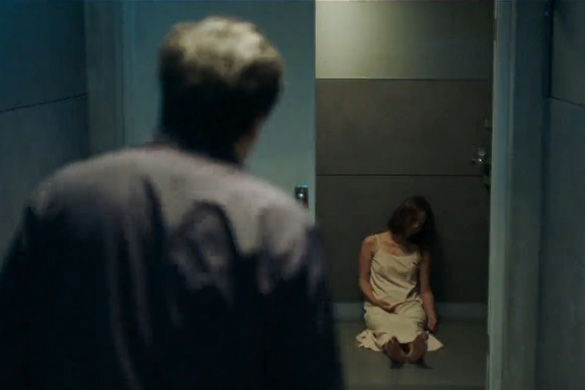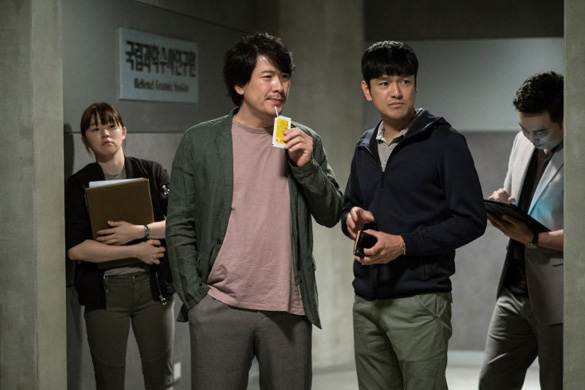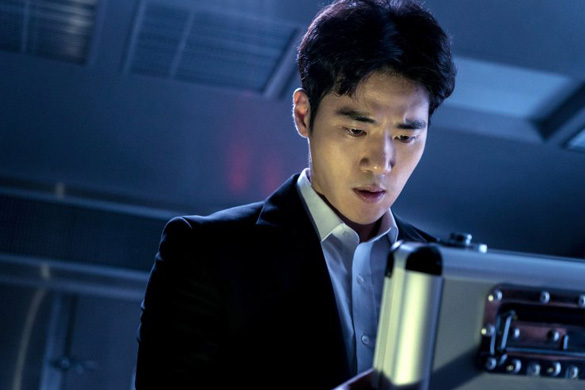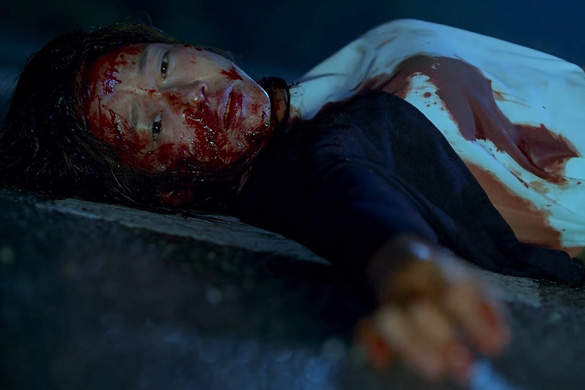
 |
||||
When conglomerate owner Yoon Seol-hee (Kim Hee-ae) dies unexpectedly her body is taken to the morgue of the National Forensics Service. Shortly after, as a security guard of the NFS building investigates intermittent electricity and lightning problems during a night shift he discovers that Seol-hee's body is missing, almost immediately being struck and knocked unconscious by an unknown, hooded attacker. Arriving to interview the guard, police officers led by detective Jung-sik (Kim Sang-kyung) also inform Seol-hee’s husband, Jin-han (Kim Kang-woo), by phone of the corpse's disappearance and he (seemingly somewhat grudgingly) drives to the scene straight away to find out what on earth is going on.
Review: Based on Oriol Paulo's 2012 Spanish film El Cuerpo (The Body), The Vanished begins in accomplished style with a deeply atmospheric pre-title sequence:
Immediately following this opening scene, we are introduced to Jin-han and detective Jung-sik in turn. Jin-han in his bathroom putting drops in his eyes to simulate tears at a family gathering to mourn Seol-hee’s death speaks volumes of his true feelings for, and relationship with, his wife, and a discussion between police officers about Jung-sik prior to his arrival at the NFS building point to him having a ‘past’ resulting in him being a heavy drinker and likely causing him to move from elsewhere to work in this locale. Both men’s pasts are revealed to a greater extent through flashback sequences that are vital to both the overall narrative tale and indeed the relationship between them as the interrogation builds while the true state of play ever so gradually starts to come to the fore – the flashbacks being entirely warranted, wholly necessary and deftly realised as such. As the investigation into the disappearance of Seol-hee’s body gets underway, The Varnished (deliberately) appears as a procedural thriller but as the story unfolds equally in focus is the psychological battle between Jung-sik and Jin-han. Great performances from both Kim Sang-kyung combine with a well written script to ensure their biting interactions are wholly engaging, more often than not gripping. With the question of whether or not Jin-han really did try to murder his wife answered fairly early on (from viewers’ perspective, if not Jung-sik’s), the narrative’s ‘whodunnit’ element is of course centred on the missing corpse (that is, if Seol-hee really is dead... or not) but inherent and as important to this is the ‘Why?’ of the matter. Numerous story elements (a clock/calendar on a wall in the present day reading ’20 July 2007’; calls to both Jin-han and his lover from Seol-hee’s phone number; evidence relating to Seol-hee’s apparent death left in the morgue drawer for Jin-han to find; etc etc) give clues to the real state of play throughout the build to the film’s culmination, but depending on whether viewers believe Jin-han took the body; think Seol-hee is still alive; assume a third party is involved; or indeed feel that something ghostly is going on, many of these moments could equally be seen as narrative red herrings of a sort. In fact, these could mostly be seen as either with which you see them as wholly dependent on your perspective of what you've already witnessed.Regardless of which of the above you believe is the true state of play, The Vanished plays its many cards so well that I virtually guarantee you will at least consider changing your mind on more than one occasion. That being the case, when the final reveal takes place it feels wholly satisfying, regardless of whether you’ve fully figured out what’s really going on or not.
And speaking of the reveal: Over the years from the NKC wave through to recent times, a number of Korean films have had similar character arcs (I realise I’m being rather vague here but to name any specific examples would risk giving the game away, marring your enjoyment in the process) but while a number of those could be said to be rather forced, contrived or overly predictable, The Vanished never felt as such to me and, as far as I’m concerned, in spite of the reveal requiring exposition in both dialogue and flashback (normally a major bug bear of mine) I was able to accept its use with little criticism at all. One thing is for sure, The Vanished is so confident, assured and well crafted that you’d never assume this is a director’s debut feature, unless you were aware of that fact in advance. As a final note: The Vanished’ cinematography is exemplary throughout but what stands out most in terms of visuals are a number of absolutely gorgeous passing moments that point to director Lee Chang-hee’s directorial flair. From the glasses of a doctor steaming up while taking a sip from a hot cup of coffee before giving her theory on the body’s disappearance; to Jung-sik holding up his phone to look at the picture of his girlfriend on its lock screen, becoming a moving image as she lifts her head and smiles while the area around and behind the device morphs to become the surroundings from which the picture was taken - transporting us back to a different time and place in flashback in the process - these moments add a strength to the visuals to equal that of the narrative itself.
THE VANISHED (사라진밤) / 2018
|
||||
All images © Sidus Pictures Review © Paul Quinn |
||||



